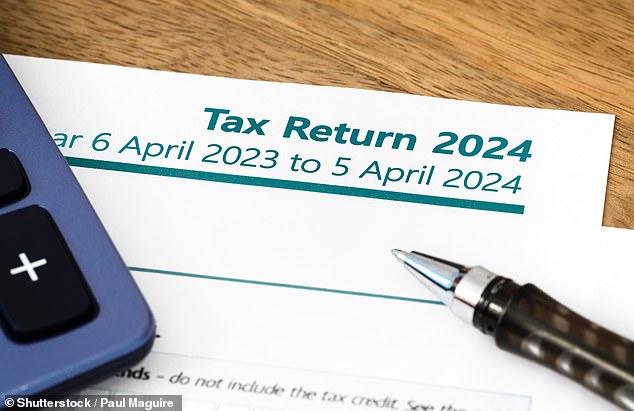Table of Contents
I changed jobs and my salary increased from just over £100,000 to £130,000 in May 2023. This meant I lost all my personal allowance.
I thought my employer was deducting this from my salary as all my income is PAYE, but it turns out they weren’t and now I’m going to end up with a big bill when I do my tax return.
Is there any benefit to me in not waiting until January and filing my 2023 and 2024 tax returns now?
I now have to complete a tax return because I earn £130,000 – should I do this sooner?
I read that if I do it early I may be able to pay any amount I owe in instalments deducted from my monthly salary, but this only applies to amounts under £3000.
I paid £4,000 into a Sipp to try and reduce my potential bill just before the end of the tax year, so I’m not sure how much I’ll owe.
If I owe more than £3,000 and I file my tax return early, will I have to pay it all at once?
This Is Money’s Angharad Carrick responds: The rules around personal allowance and tax returns can be confusing, so your situation is quite common.
The personal allowance is currently set at £12,570, so you don’t have to pay tax on any income before then.
However, higher earners eventually lose their personal allowance. For every £2 you earn over £100,000 you will lose £1 of your allowance, meaning that once you earn £125,140 you will no longer have access to the personal allowance.
This means you will have a higher tax bill than you anticipated, because you no longer qualify for that tax-free income.
Before this tax year, people earning more than £100,000 had to complete a self-assessment tax return, but this limit has since been increased to £150,000.
However, many accountants recommend that those earning between £100,000 and £150,000 complete a tax return, especially if they have other allowances such as personal pension contributions or other income. If they don’t, they could receive a surprise bill from HMRC, just like you.
Your employer hasn’t deducted it from your salary because they deduct it through PAYE according to your tax code, which is usually set at various points in the tax year. So when you get a pay rise, it’s not going to change straight away.
We asked two tax experts for advice.

Lee Murphy, from Accountancy Partnership, says you should ask your employer to check your records
Lee Murphy, CEO of The Accountancy Partnership, says: The general rule for self-assessment is that the sooner you can send your records to HMRC, the better.
You’ll usually know exactly what you owe almost immediately, but submitting your self-assessment before the deadline doesn’t mean you have to pay before the deadline.
A self-assessment for the 2023/24 tax year could be submitted today and payment of any tax due would not be due until midnight on 31 January 2025.
But the threshold for who must file a self-assessment has changed, so only those whose taxable income is more than £150,000 need to do so.
Employers typically deduct tax and National Insurance from the wages they pay to employees and report these deductions to HMRC through PAYE.
The PAYE reporting process relies on employers deducting and reporting these figures correctly.
If an employer deducts the wrong amount of tax or National Insurance or uses the wrong tax code, this can result in overpaid or underpaid taxes.
HMRC usually sends a P800 notice. If the underpayment is the result of the employer’s mistake, it is their problem to fix it, even if they are reluctant to do so.
You should speak to your employer and ask them to review their records, or HMRC may ask you to check them so you can identify the source of the error.
HMRC will still expect you to pay the tax due.
Chris Springett, tax partner at Evelyn Partners, says: As a tax advisor, I always tell my clients to resolve their tax matters as soon as possible.
While organizing your tax affairs is a task that most people consider mundane, having a clear idea of what your tax bill will look like as early as possible will allow you to adequately prepare for the payments that will be necessary.
With your new position and higher salary, you are now in a situation where you are no longer entitled to receive a personal allowance, which is the amount of income on which you do not have to pay taxes.

Chris Springett, tax partner at Evelyn Partners, says it’s always a good idea to sort out your tax issues as soon as possible.
Once your income exceeds £125,140, your personal tax allowance will be zero. Given your current salary of £130,000, you are in this situation.
It looks like your PAYE code – the code your employer uses to calculate how much income tax to deduct from your pay – did not reflect this loss of deduction. Therefore, you have not paid enough tax through PAYE for the 2023/24 tax year.
Since you will be required to pay income tax, you will need to ensure that you have registered for self-assessment by 5 October 2024, if you have not already done so.
The process is simple and can be done online, but it may take some time for HMRC to process your information. Therefore, I suggest you register as soon as possible.
Once registered, you will be able to declare your income for the tax year along with your pension contributions, via an online tax return. HMRC will then calculate how much you need to pay in tax.
Contributing to your SIPP will reduce your tax liability, so you should make sure you report your pension contribution correctly when completing your tax return.
Although you must file your tax return and settle any outstanding taxes for the 2023/24 tax year by January 31, 2025, you do not need to pay any obligations immediately if you complete the return earlier. Completing your tax return today does not change that payment date.
You will be asked to make additional payments for the current 2024/25 tax year, called ‘payments on account’. This is often a shock to those who have recently registered for self-assessment.
You will only be required to make a payment to HMRC on the basis that 80 per cent of your tax for the year was deducted through PAYE.
If this is not the case, you will also be required to make additional payments towards your liability for the current 2024/25 tax year, called “payments on account”.
These are due on January 31 and July 31 of each year and are deducted from your final tax bill once you have calculated your liability for the year.
This is often a shock for those who have recently registered for self-assessment, as they settle their tax liability for one tax year and pay in advance for the following year – another reason to make sure you get organised as soon as possible. HMRC’s online system will calculate and let you know if these advance payments need to be made too.
There is also the option to choose to have the underpayment collected via PAYE rather than making a payment to HMRC.
However, this is only available where your unpaid tax liability is less than £3,000 and your tax return is filed online before 30 December 2024 (31 October 2024 if you file a paper copy).
There is a specific box that needs to be ticked on your tax return, and HMRC will adjust your tax code for the following tax year (2025/26) to ensure the correct amount of tax is taken for that tax year, whilst also recovering your unpaid liability too.
This would result in the tax being collected monthly for the next tax year rather than having to be paid in a lump sum.
Taking all of the above into account, there are some real benefits to filing your taxes sooner rather than later.
Murphy adds: HMRC may offer you the option of applying for a payment plan which, if approved, will allow you to budget so that repayments are manageable for you.
If your tax bill exceeds the £3000 threshold for tax code adjustment, you will not be able to pay it through your tax code.
But you will still have until midnight on January 31, 2025 to pay any taxes owed, and you may have more time to pay if a payment plan is approved.
HMRC will ask you if you can make an immediate payment and it is always better to do so if you can, so that repayments (over a maximum period of 12 months) are smaller.
SAVE MONEY, EARN MONEY

Savings offers

Savings offers
Premium fares plus £50 bonus until 15 July

Isa cash at 5.17%

Isa cash at 5.17%
Includes 0.88% bonus for one year

Free Stock Offer

Free Stock Offer
No account fees and free stock trading
5.78% savings
5.78% savings
Has 365 days notice

Fiber broadband

Fiber broadband
BT £50 Reward Card: £30.99 for 24 months
Affiliate links: If you purchase a This is Money product, we may earn a commission. These offers are chosen by our editorial team as we believe they are worth highlighting. This does not affect our editorial independence.
Some links in this article may be affiliate links. If you click on them, we may earn a small commission. This helps us fund This Is Money and keep it free to use. We do not write articles to promote products. We do not allow any commercial relationship to affect our editorial independence.


